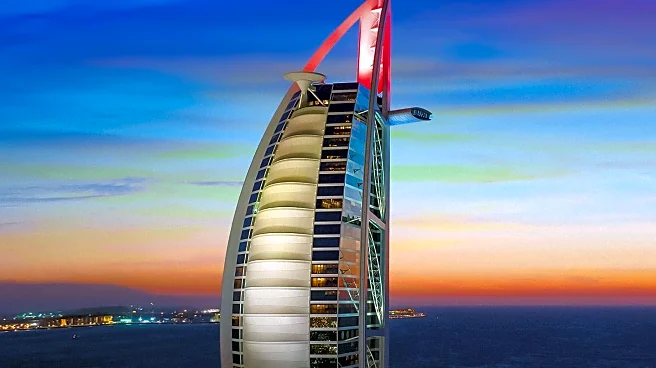What's Happening?
Hotel J, located in Nacka Strand near Stockholm, has undergone a significant transformation to become a year-round wellbeing retreat. The renovation, led by Helena Toresson and Wingårdh Architects, focused
on sustainable design and the integration of wellness rituals rooted in nature. The hotel now features several new additions, including the Terrace, Panorama Sauna, Pavilion, and Garden House, each designed to enhance the guest experience. The renovation also included a revamp of all 158 rooms, emphasizing reuse and sustainable design, with a modern Nordic sensibility. Signature Seaview rooms offer a complete wellbeing experience with amenities such as red-light therapy lamps and aromatherapy oils. The hotel aims to provide a peaceful setting for guests to pause and reset, embracing the healing power of nature.
Why It's Important?
The transformation of Hotel J into a wellbeing retreat reflects a growing trend in the hospitality industry towards experiential and wellness-focused offerings. This shift is significant as it aligns with increasing consumer demand for experiences that promote health and relaxation. By integrating Scandinavian design and locavore food, Hotel J is tapping into the desire for authenticity and sustainability, which are becoming key factors in consumer decision-making. The hotel's focus on wellness rituals and nature-based activities positions it as a leader in the market, potentially attracting a new demographic of guests seeking holistic and immersive experiences. This trend could influence other hotels to adopt similar strategies, impacting the broader hospitality industry.
What's Next?
Hotel J plans to expand its wellbeing program, which currently runs from Friday to Sunday, to daily sessions during the summer. This expansion will include dynamic and recovery classes, such as pilates and yin yoga, as well as mindful activities like forest bathing. The hotel will also host private events and social gatherings, transforming spaces like the Terrace into seasonal attractions, such as a winter wonderland during Christmas. These developments are likely to enhance the hotel's appeal and increase its competitiveness in the wellness tourism sector. As the hotel continues to innovate, it may set a precedent for other establishments looking to integrate wellness and sustainability into their offerings.
Beyond the Headlines
The renovation of Hotel J highlights the ethical and environmental considerations in modern hospitality design. By focusing on reuse and sustainable materials, the hotel is addressing the growing consumer concern for environmental impact. The integration of wellness rituals rooted in nature also reflects a cultural shift towards valuing natural and holistic approaches to health. This transformation could inspire other hotels to consider the long-term benefits of sustainable and wellness-focused design, potentially leading to broader industry changes. Additionally, the hotel's emphasis on creating a peaceful and immersive environment may contribute to a cultural appreciation for slow living and mindfulness.









